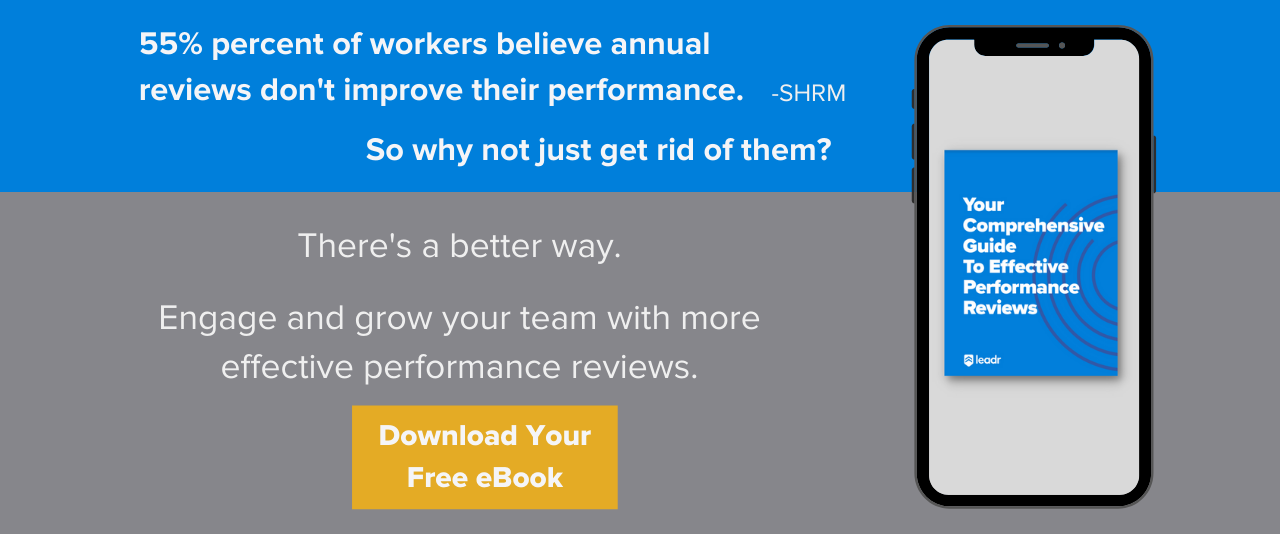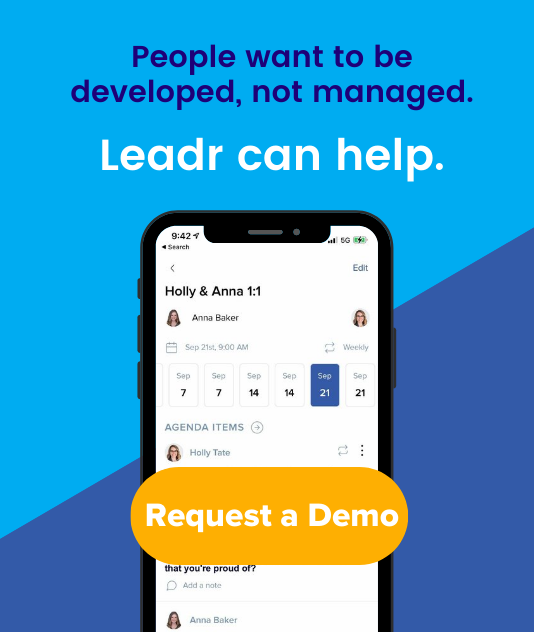A New Performance Review: Separating Pay and Performance
The annual performance review conversation is a high-stakes encounter. Traditionally, employees work all year in the direction that they think is best. Then they walk into a meeting that tells them, often for the first time, whether their work is acceptable and how much they are going to get paid in the coming year.
These infrequent conversations come with significant implications and cause people at all levels to feel on edge.
But what would happen if you separated the conversation about performance from the one about pay? At Leadr, we have found that while these two crucial conversations are linked, they are more effective when they do not occur simultaneously.
The Performance Review
As the next generation enters the workforce, they are seeking jobs that help to develop them as a person and a professional with less of an emphasis on how they can get paid more. Separating the performance and pay conversations helps your employees to identify that their value to your organization is measured by more than just their pay.
While traditionally, the performance review is surrounded by an element of mystery and suspense, these feelings are not the traits of an effective performance conversation. Productive conversations are ongoing, forward-thinking, and aligned.
Ongoing Conversation
Having an effective performance conversation starts long before the annual reviews are scheduled. Tradition dictates that performance is discussed once a year in a summative conversation, but a more effective approach requires more frequent conversations. Holding weekly 1:1 meetings with members of your team creates an opportunity to provide feedback while it is still relevant and meaningful. These meetings become a documented record of performance that managers can use to objectively evaluate their employees when it comes time for the annual review.
Forward-Thinking
Performance reviews also benefit from a shift in focus. Rather than utilizing this time to scrutinize all of the mistakes and faults that have been made throughout the year, approach these conversations with the mindset of a coach by looking to the future as well. Take time to examine how the strengths of each individual helped to further the mission and goals of your organization and then define the expectations that you have for them in the coming year and listen to the goals that they have for themselves. Think: how can I help guide and coach this person towards success?
Aligned
The topics discussed in a performance review should not come as a shock to your employees. If you have been engaging in ongoing conversations about performance throughout the year, they should have a fairly good idea of what will be said during their review. Taking the time to compare perspectives during the conversation can help to reveal any missed feedback opportunities. It also helps to remove tensions between how your employee viewed their performance versus what you observed.
The Compensation Conversation
When you separate the pay and performance conversations you change the focus from the numeric value of that individual to the productive contributions that they provide to your organization. This allows you to have a separate, lower-stakes conversation about compensation at a later time. We recommend separating the performance review from the conversation about pay by at least a month, two is better. This space allows you and your employees to focus on the purpose of each conversation without causing the two to become intertwined.
When trying to determine pay increases, there are three things to consider: cost of living, value-added, and market adjustments.
Cost of Living
Cost of living also takes into consideration things like inflation. With the inflation rate currently at 5.9%, everyone is trying to make the most of their money and an appropriately proportional increase in pay helps to alleviate that stress.
Value-Added
Determining the value an employee adds requires examining several things.
- What are the costs to replace this person? What will it cost me to recruit and train a brand new employee?
- What is this individual adding to my organization? This is where the performance conversation links into the compensation conversation.
- Who can I not do this without? Sometimes budgets don’t allow for every employee to get a value-add increase in pay. In those cases, you have to identify the most important individuals and ensure that they are appropriately compensated. Consider a one-time bonus for those who outperformed but you cannot increase salary for.
Market Adjustments
The final thing to think about is the market value of a particular position. As the demand for certain skills changes and the responsibilities of particular roles evolve, you need to ensure that the compensation that you are offering for that position matches the market value. If they have not kept up with the market value of a role, you risk losing that individual to an organization that will compensate them appropriately.
Pay and performance are such important conversations to have. What are your biggest obstacles to having productive conversations about these topics?
At Leadr, separating the conversations about pay and performance is just one way that we seek to better care for and develop the people in our organization. At the end of the day, people are looking to be led and developed, not managed. Our software can help you focus on putting your people first. Click here to request a demo today.
Share this
You May Also Like
These Related Stories

Are Performance Reviews Outdated?

The Complicated Relationship Between Pay & Performance





No Comments Yet
Let us know what you think